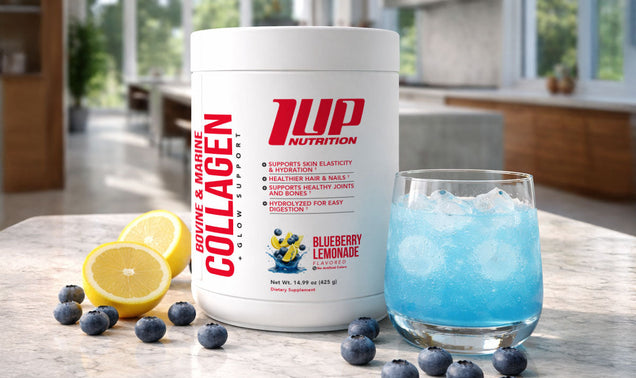Building muscle is really pretty simple from a high-level view. It requires only three basic things:
- Consume enough protein
- Eat more calories than your burn
- Challenge your muscles to perform more work than they have previously
Do those three things long enough, and you will build muscle (bulk up).
Where things get complicated and somewhat confusing is when you start to drill down into the specifics, such as how many more calories do I need to eat above maintenance to build muscle.
For example, if your total daily energy expenditure (TDEE) is 2000 calories, is consuming 2200 or 2300 calories a big enough surplus to support muscle growth at a decent rate. Or, do you need a much larger surplus, something on the order of 2750 to 3000+ calories?
This dilemma is something gym rats looking to pack on lean muscle mass face everyday, so you’re not alone!
Not by a long shot.
The question of how big of a calorie surplus do you need to build muscle necessitates a discussion of one of the biggest debates in fitness -- clean bulk vs dirty bulk.
The Difference Between Clean Bulk vs Dirty Bulk
When it comes to adding muscle mass, you’re faced with two options:
- The clean bulk, or
- The dirty bulk
A “clean” bulk involves using a modest calorie surplus, such that you gain weight at a slow rate (.05-1.0 lbs per week) with the intention to limit fat gain as much as possible during your bulk. This generally equates to an energy surplus between 25-50% above TDEE (500-1000 calories for most people).
Clean bulks typically limit the amount of “dirty” foods (high-fat, hyper processed foods) a person eat. The majority of their diet consist of clean foods -- lean proteins, whole grains, fruits, vegetables, and healthy fats.
The “dirty” bulk is the opposite of the clean bulk, whereby you essentially follow the “see food, eat food” diet. There are no restrictions or limits placed on your calorie intake or even what foods you consume to hit your calorie goals.
Your focus is on gaining weight as quickly as possible, with the thinking that this maximizes muscle growth.
So, which is better for building lean muscle?
In the vast majority of cases, the clean, lean bulk is the way to go.
The reason for this is that more is not better, especially when it comes to your calorie intake and trying to build muscle.
You see, the body can only synthesize a finite amount of new muscle tissue in a given timeframe. Any calories consumed in excess of those used for the construction of new muscle will be stored as fat.
The one instance when the dirty bulk may be the way to go is if you are a rank beginner. As such, you have a larger capacity to build muscle than someone who has been training consistently for several years. In fact, during your first year of training, you may be able to build as much as 15-20 pounds of muscle. As you become more trained, the rate at which you can build muscle decreases with each successive year.
This is why for trained individuals the slow, lean, and clean bulk is the way to go for muscle gain.
Drawbacks of Dirty Bulking
Increased Fat Gain
As we mentioned above, the body can only build so much muscle tissue at a given time. Therefore, consuming substantially more calories that your body needs to support the muscle-building process only begets excessive fat gain.
The more body fat you accumulate during your bulk, the longer you’ll have to spend in a caloric deficit to burn it off later. This is a problem because long periods of dieting can decrease levels of anabolic hormones and increase levels of catabolic hormones, which is the perfect recipe for muscle loss.[1,2]
The last thing you want is to lose all the muscle you just spent months building, but there’s more.
Decreased Nutrient Partitioning
The more body fat you carry around, the worse your body gets at partitioning nutrients. This means that your body becomes less efficient in storing nutrients in muscle and starts shifting more of them into fat cells, which makes building muscle more difficult the fatter you get.
Bloating & Discomfort
When dirty bulking, you inevitably try to stuff yourself full with huge amounts of calories every day, even eating at times when you’re not hungry all for the pursuit of fast mass gains.
This quest to eat everything in sight can lead you to feeling bloated and sluggish throughout the day, which makes it less likely that you’ll get in any sort of cardio.
Clean bulking involves eating a smaller calorie surplus, which helps avoid bloating, and typically a bare minimum of 2 cardio sessions per week to help limit fat gain during the bulk. This combination leaves you feeling energized and in a better emotional and psychological state.
Always concentrate on 1) Nutrition, 2) Training and 3) Rest. And let 1UP Nutrition supplements assist you with all 3. We’re committed to helping you achieve all of your health and fitness goals, and that’s why we’ve created a versatile arsenal of high-quality supplements specifically tailored to meet your bulking needs muscle building, and everyday health and wellness.
References
- Cangemi R, Friedmann AJ, Holloszy JO, Fontana L. Long-term effects of calorie restriction on serum sex-hormone concentrations in men. Aging Cell. 2010;9(2):236–242. doi:10.1111/j.1474-9726.2010.00553.x
- Tomiyama AJ, Mann T, Vinas D, Hunger JM, Dejager J, Taylor SE. Low calorie dieting increases cortisol. Psychosom Med. 2010;72(4):357–364. doi:10.1097/PSY.0b013e3181d9523c






